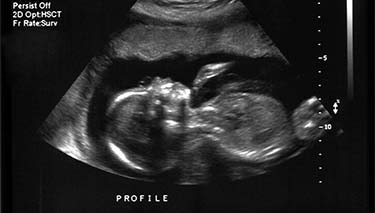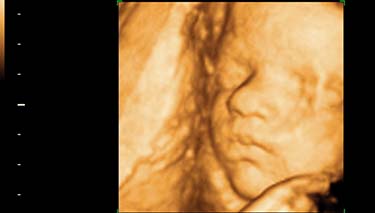NB Resolution /pregnancy/health-and-care/congenital-disorders
Not an active link so can t include in article
Women are routinely offered prenatal testing to see if their baby is at an increased risk of having Down syndrome. Depending on the results, more testing can be done to give a clearer result. Down syndrome testing can also be done after a baby is born.
Screening for Down syndrome is done first and if indicated, diagnostic testing is done next.
What is Down syndrome?
Down syndrome is a genetic, chromosomal condition. In every cell of the human body there are 23 pairs of chromosomes. One chromosome in each pair comes from the mother and the other comes from the father.
Down syndrome occurs at the time of conception and is not under the direct influence of a woman or her partner. When someone has Down syndrome, there is an extra copy of the 21st chromosome in their cells. Instead, they have 47 chromosomes instead of 46. This is why another name for Down syndrome is trisomy 21.
Down syndrome is the most common chromosome disorder that we know of. Statistically, 1:1100 babies born worldwide will have Down syndrome. In Australia, there are over 13,000 people with Down syndrome.
People with Down syndrome have a range of characteristics which vary between individuals. Intellectual, developmental and health challenges are common as well as having certain characteristic physical features.
When can I get tested for having a Down syndrome baby?
The combined first trimester screening test can be done between 11-13 weeks of pregnancy. This is done via ultrasound and a blood test.
Risk factors for Down syndrome
- Advancing maternal age is one clear risk factor for having a baby with Down syndrome. This is because older eggs do not divide as well as younger ones do. After the age of 35 the risk increases. However most Down syndrome babies are born to women under the age of 35 because they have more babies.
- Being carriers for genetic translocation for Down syndrome ca be passed on by both men and women.
- Having one child with Down syndrome previously.
There are two levels of testing for Down syndrome
Screening tests These provide insight into whether the baby is at an increased risk of having Down syndrome.
Diagnostic tests Give a more accurate result about whether a baby will have Down syndrome.
Combined first trimester screening
The combined first trimester screening test can be done between weeks 11-13 of pregnancy. Results from a blood test are examined for hormonal changes in the mother which can detect issues with the baby's chromosomes. An ultrasound is also done between 12-13 weeks and examines the back of the baby's neck and measures how much fluid is present. This is called nuchal translucency. In babies with Down syndrome the nuchal fold is bigger and there are also changes in the formation of the baby's nose.
A computer analysis combines the results of the two tests + the mother's age to give a risk profile of the baby having Down syndrome. If there is found to be an increased risk, a diagnostic test may be advised.
The combined first trimester screening test costs around $350.00 after the Medicare rebate.
NIPT
The non-invasive prenatal testing (NIPT) is another option for genetic screening. This is a new, highly sensitive test which analyses the mother's blood and checks for DNA from the baby. The NIPT can be done from 10 weeks of pregnancy and has a 99% accuracy result for detecting Down syndrome.
The NIPT test is not covered by Medicare and is not routinely offered to pregnant women. It costs around $450.00.
Down syndrome as well as other chromosomal abnormalities are tested for as well in the NIPT. IF the result shows an increased likelihood of the baby having Down syndrome, diagnostic testing such as CVS sampling and/or amniocentesis are advised.
Be mindful
That different screening tests can provide different results dependent on what is being tested. Sometimes results can indicate a high chance of Down syndrome when the baby does not have it. A low chance result can also be returned when it is present.
Ask your maternity care provider about the specific testing you are being offered.
Second trimester screening
Is done between weeks 14-22 of pregnancy. In the second trimester of pregnancy, a maternal serum test, also called an MSS or triple test can be done between weeks 14-18. If the combined first trimester screening test hasn t been done, the MSS is another option. This is a blood test which looks for hormones which may be present from the baby's blood.
Most pregnant women have an ultrasound between weeks 19-20 of pregnancy. This helps to see that the baby is growing and developing normally and to screen for any complications. Down syndrome may be detected at this scan.
Diagnostic tests for Down syndrome
The most accurate way of knowing if a baby has Down syndrome is to have a diagnostic testing. These are generally not advised unless first, the preliminary screening results show the baby is at increased risk.
Diagnostic tests for Down syndrome increase the chances of miscarriage so they need to be carefully considered before giving consent. Women who have had previous children with genetic or chromosomal abnormities and older women are more likely to be advised to have diagnostic testing.
Two tests to diagnose Down Syndrome
Chorionic villus sampling also known as CVS.
This is when a fine needle is used to collect cells from the placenta. Pathology testing looks for missing, abnormal or extra chromosomes which show Down syndrome is likely. CVS is generally done between weeks 11-14 of pregnancy. At the same time the CVS is being done, an ultrasound helps to guide the safest and correct position for the needle to collect the cells.
Amniocentesis
A fine needle collects a small amount of amniotic fluid and this is examined, looking for extra or missing chromosomes. Amniocentesis is generally done between weeks 15-18 of pregnancy. An ultrasound is done at the same time to minimise risk and make sure the needle is inserted accurately.
Both CVX and amniocentesis involve collecting a sample of the baby's genetic material to be examined in a pathology clinic. Results from tests are generally back within a week.
Diagnosing Down syndrome after birth
Babies with Down syndrome have similar physical characteristics. When they are born, all babies are examined and checked by a healthcare professional.
A blood test taken from the baby can confirm the diagnosis of Down syndrome. This checks for the number of chromosomes in the baby's cells.
Decisions
It's useful to consider what you may do once you have the results of your Down syndrome testing. If the diagnostic tests indicate Down syndrome, you will be offered a choice about whether you want to continue with the pregnancy or terminate. This is a highly personal decision, best made after discussion with your maternity care provider, partner and family. There are a number of options when it comes to counselling and being supported.
Speak with your maternity care provider about consulting with a genetic counselor. You can also speak with someone from the Down syndrome organisation for additional insights.
FAQ
How long does it take to get CVS and Amniocentesis tests back?
You will need to speak with your maternity care provider about the results. Depending on the findings, you may be referred to a genetic counselor.
Do I have to have testing for having a baby with Down syndrome?
Like all other prenatal tests, you have a choice about what screening is right for you. Some women decide on one level of testing before they make a decision about the next stage.
Written for Huggies by Jane Barry Midwife and Child Health Nurse on 24/04/20.


Last Published* May, 2024
*Please note that the published date may not be the same as the date that the content was created and that information above may have changed since.

















